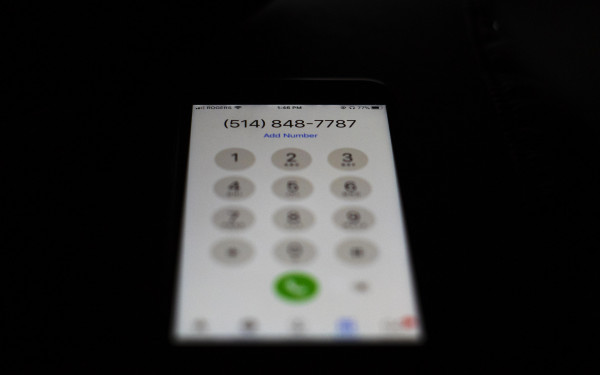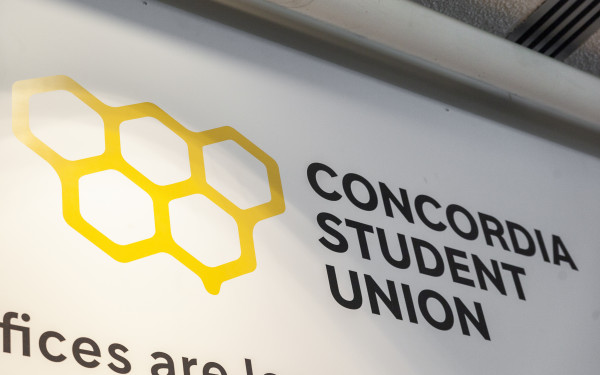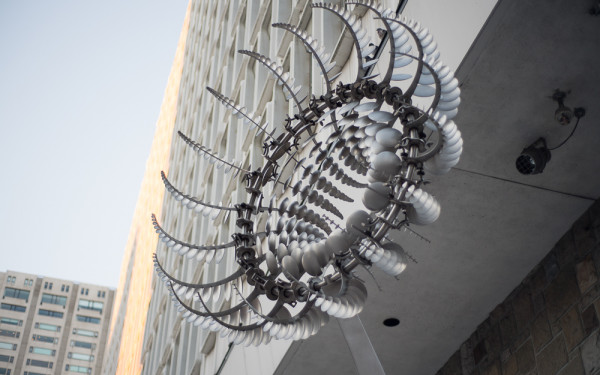Nightline and the Art of Listening
Concordia Students’ Nightline Volunteers Share What It’s Like to Answer Anonymous Calls
You may have seen their slogans on posters in bathroom stalls or on the walls inside campus buildings:
“Anonymous, confidential, non-judgmental.”
“Need to talk? We listen.”
For the past two years, Concordia Students’ Nightline has provided Concordia students the opportunity to phone in and open up about anything they have in mind.
The service is confidential and prides itself on being judgment-free.
Nightline recently won its referendum to become a fee-levy group, meaning it will receive a subsidy per credit from students—in this case, five cents.
With an increased budget, the service will seek to open every day of the week. Currently, it’s available Thursdays to Saturdays from 6 p.m. till 3 a.m.
As of now, the service has 32 volunteers in its ranks, all anonymous Concordia students from different programs and paths of life. Yet, they all share the same wish to help others.
Even friends and family are unaware of the volunteers’ involvement with Nightline. “Yeah, I’m basically like Peter Parker,” joked Charlie after I compared her secret activities to those of comic book superheroes who often live a hidden second life.
Charlie—not her real name—has volunteered with Nightline since it was created in 2017.
Volunteers require anonymity to ensure the service is available to as many people as possible. The Link has agreed not to reveal their identities and has instead assigned pseudonyms.
“Anonymity is so important to us because we feel that we take the service away from every person we tell,” said Charlie. “You may not want to call the service if you know I’m working there.”
As a psychology student who wishes to become a therapist helping people who are dealing with mental health issues, Charlie joined to work on her listening skills.
She said most volunteers share a sense of empathy when it comes to helping others.
“I feel like everyone has a feeling of wanting to be part of something bigger in the university and also wanting to contribute and give back to the community in some way,” said Charlie. “That’s a general reason why people join.”
Volunteers are trained in active listening, a technique that prizes robust comprehension and intent focus on the speaker. Nightline and its volunteers say this can be hard to come by, as most people do not listen to understand, but to reply.
“I didn’t realize that until I was trained,” said Riley, another volunteer whose real name could not be identified.
“What I had been doing was not listening. I really think people spend more time waiting to talk than listen.” Riley, like Charlie, wishes to become a psychologist and believes active listening is a critical skill.
For Charlie, active listening is “like being an oral journal for people.”
“When someone is talking to me and I’m recognizing what they’re saying, I’m offering no judgment,” said Charlie.
“I’m offering them that space where they’re able to open up and talk about what they want. I didn’t realize until then how therapeutic it is for people.”
Nightline was created in part to cover the gaps of Concordia’s Counselling and Psychological Services, which is not available all the time.
“We are here to provide something Concordia services cannot, which is supportive listening,” said Camille Zolopa, president of Nightline, who added that Nightline has a broad mandate.
“It doesn’t have to be anything mental health related,” said Charlie.
“We definitely have callers who call just for two minutes to talk about their day. People will sometimes call to chat about music, what’s happening around the world, or even SpongeBob.”
One of Charlie’s most memorable calls happened when she found herself on the other side of the phone.
She couldn’t sleep, and with so many thoughts running through her head, Charlie decided to call Nightline herself.
She ended up talking for three hours.
“There were so many things on my mind. Not only bad things, but also great things,” said Charlie. “
After that, I felt so relieved and I thought, ‘Wow, someone is actually out there to listen to me and understand me.’ And I thought, ‘That’s how some of my callers feel after I talked to them.’“
Nightline volunteers believe the service is also important to help students cope with the stressful school environment.
“School really puts that pressure on people,” said Charlie. “You have to perform well. A lot of people I see worry about their GPA.”
According to a poll by the Quebec Student Union, a federation of student unions at various universities, one in five university students deals with depressive symptoms serious enough that they should receive care.
“I’m offering them that space where they’re able to open up and talk about what they want. I didn’t realize until then how therapeutic it is for people.” —Charlie, a volunteer with Concordia Students’ Nightline.
With more than 40,000 students at Concordia, the university’s mental health services can be overwhelmed by people seeking appointments. Nightline helps fill that demand.
“I see many students complaining about how they’re not able to access a psychological centre and how they have to wait months for an appointment,” said Charlie.
“It’s not the fault of the centre. They only have a certain number of therapists.”
There are not a lot of other options for students, Charlie said.
Even though volunteers are not professionals, each one goes through a selection stage with Nightline before being trained for dozens of hours to acquire those listening skills.
The service also differentiates itself from other mental health services by using a non-directional approach.
“We are not here to find a solution for the other person,” said Charlie. “There may not be one. We never know.”
“The more you learn about it, the more you realize there’s a void of [listening] in the world,” said Riley.
“When I talked to my friends, I used to always give advice. And it’s like, no. Just shut up and listen.”
Riley said that for callers, getting things off their chests can be a cathartic experience.
Being on the other side of the line is also an experience.
Volunteers must take shifts until late at night—sometimes until 3 a.m. on weekends—and receive a wide range of calls from people they will never meet, all while not being able to confide in people in their lives about what that’s like.
While some calls volunteers receive are lighthearted, others can be deeply challenging.
“All of us have gotten upsetting calls,” said Charlie. “It can be for various reasons—suicide, things that are happening in their life, abuse, etc. That can be very heavy for anyone to listen to. […] We all have our own triggers.”
Many of the volunteers have experienced their own share of mental health issues or have had someone in their own life deal with it.
Though it can bring them comfort by helping others and knowing other students go through similar struggles, some calls can leave volunteers with unresolved feelings.
“I find it a little bittersweet,” said Riley. “Sometimes you connect with callers and relate to their situation. You want to know what’s next. It’s sad in that sense.
“You don’t get to follow them on their journey. When the call is over, it’s over. But it’s also really nice. You get to feel like you helped them. You feel like you made a difference in that person’s life. Even if it’s a little bit,” she said.
Volunteers are expected to share their experiences with each other after a call.
While they learn from this, it’s also a way to help deal with unresolved feelings and difficult calls.
“The community is so tight. We’re like a family. You really have to be there for each other in order to make the nightline succeed,” said Charlie. “If I have a call where I am personally affected, I would expect or I would want one of my co-workers to support me.”
Through all its facets, volunteers at Nightline take a lot of pride in what they do, even if they cannot earn credits or be publicly praised for their work.
“That’s the beautiful part of our organization. People join not because we get credits,” said Charlie, who wishes to continue being part of Nightline for a third year. “It’s a very selfless thing to do.”
Due to the closure of Concordia, Nightline is using a temporary number, (438) 812-6484.
Charlie emphasized that anyone, even someone who is not a student, is welcome to call for any reason.
“Call us—this might be something that can help you.”


_600_832_s.png)


_600_375_90_s_c1.JPG)

